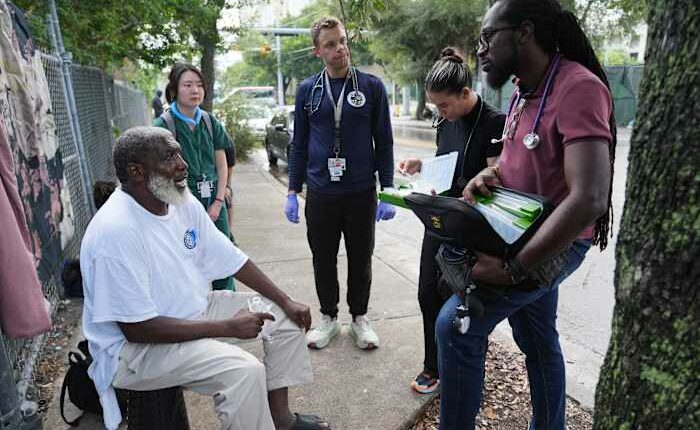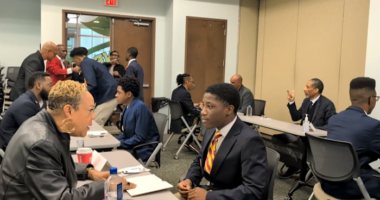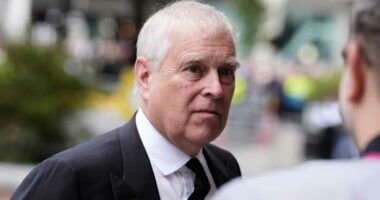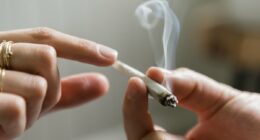Share this @internewscast.com

MIAMI – A few years back, Jonas Richards found himself without a home after losing his truck driving job. Dealing with high blood pressure and diabetes, seeking medical help has not been a top priority.
“Living on the streets is tough,” said Richards. “You’re constantly trying to hustle for some cash, figure out your next meal.”
But Richards recently had his first visit with doctors from Miami Street Medicine while sitting on a curb outside a homeless shelter.
“You get everything done right here very fast,” Richards said. “It was a big help.”
Miami Street Medicine is a nonprofit dedicated to offering free mobile healthcare to the homeless. It operates under the larger umbrella of Dade County Street Response, which includes a free clinic called Doctors Within Borders, a disaster relief team, and a mental health hotline.
Building trust with care
The Miami Street Medicine team, comprising both paid staff and volunteering medical students, goes beyond just treating minor ailments. They conduct patient assessments using tablets and schedule follow-ups for ongoing health issues. Specialists such as dermatologists, neurologists, and cardiologists are also involved.
“We aim to address our patients’ needs,” said founder Dr. Dan Bergholz. “If a cough drop is needed, we provide it. But our mission extends further. We show them we care and are there for them. So if a cough turns into pneumonia, they might allow us to check their lungs and even let us take them to the hospital.”
Bergholz initiated the foundation of Miami Street Medicine around seven years ago. His charity work with the homeless began during his undergraduate days, and he always felt more could be done.
“It just felt like we weren’t quite moving the needle for folks,” Bergholz said.
After learning more about the growing trend of street medicine and being accepted to the University of Miami’s medical school, Bergholz began working with other students to set up a program.
“I moved down to Miami early and just started hitting the streets and chatting with people,” he said. “You could call it a needs assessment.”
Just as Miami Street Medicine was taking off, the COVID-19 pandemic hit and forced the group to adjust. Bergholz connected with Dade County Street Response to provide health care to more underserved areas.
“A sort of bigger vision emerged to fill the gaps in the local social safety net,” Bergholz said.
Regular treatment
One challenge is the transient nature of homeless people, which makes it difficult to provide continual care. Dr. Armen Henderson, founder of Dade County Street Response, said the problem is compounded by laws that target homeless people.
“The criminalization of homelessness has significantly impacted our patients’ ability to be in one place to get services,” Henderson said. “For the street medicine team, they know they meet us in one place. But if the majority of those patients are now ending up in jail, now the people are trying to figure out what places are police not harassing them.”
Another challenge is fighting the common sentiment that providing services actually increases homelessness, Henderson said.
“The only thing that ends homelessness is easy access to housing,” he said. “There’s nothing that encourages people to be unsheltered. No one wants to be unsheltered. So by offering services like this, we’re actually trying to ease people’s suffering. When people come in here, they want to get off the street. They want to figure out a plan.”
An ounce of prevention
Members of Miami Street Medicine have noticed more people losing their homes in recent years as prices increase and wages remain stagnant. Dr. Inaki Bent, who oversees street medicine teams, said he’s also seen an increase in undocumented migrants on the streets as the state and federal governments have expanded immigration enforcement this year.
“I see patients here who are no longer working,” Bent said. “They’re no longer working because the fields and the construction sites have become targets. And they would prefer not to be employed or not to expose themselves to that risk.”
In addition to the individual benefit to patients, providing medical treatment on the street and at the group’s clinic prevents treatable conditions from becoming emergencies that ultimately strain the entire health care system. For example, Bent had a patient who had previously been treated for seizures at an emergency room and received a prescription, but couldn’t afford it. The patient would have eventually ended up back in the ER, but Miami Street Medicine paid for his medicine.
“So we’re able to fill that void and hopefully prevent a couple more admissions,” Bent said. “But we’re also able to do a human service for him, for our fellow man, to provide him with the necessary health care so he can begin his path toward a productive life.”
___
Follow David Fischer on the social platform Bluesky: @dwfischer.bsky.social
Copyright 2025 The Associated Press. All rights reserved. This material may not be published, broadcast, rewritten or redistributed without permission.












